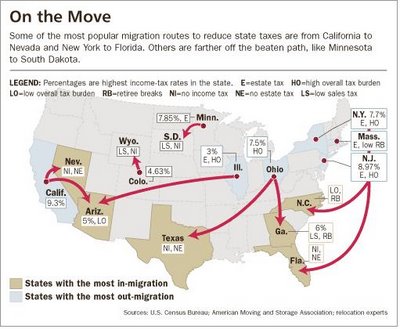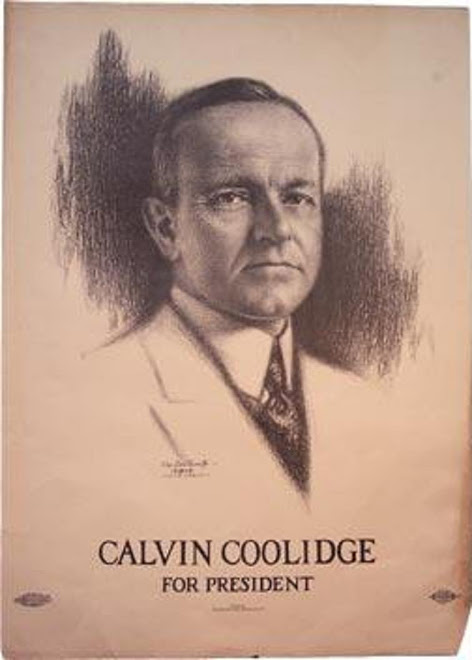I doubt that the not-to-be-named blogger considers FDR a saint, or even a praiseworthy president. Such a view would be inconsistent with the blogger's (rather murky) paleo-conservative/libertarian views. The blogger's apparent aim was not to defend FDR but to discredit me by suggesting that my view of FDR is beyond the pale.*
To the contrary, however, the perception of FDR as a dictator (or dictator manqué) with a fascistic agenda is of long standing and arises from respectable sources. Albert Jay Nock, an early and outspoken opponent of the New Deal -- and a paleo-libertarian of the sort admired by the blogger in question -- certainly saw Roosevelt's fascistic agenda for what it was. Many mainstream politicians also attacked Roosevelt's aims; for example:
While the First New Deal of 1933 had broad support from most sectors, the Second New Deal challenged the business community. Conservative Democrats, led by Al Smith, fought back with the American Liberty League, savagely attacking Roosevelt and equating him with Marx and Lenin.[21]That Smith and others were unsuccessful in their opposition to FDR's agenda does not alter the essentially fascistic nature of that agenda.
Now comes David Boaz's "Hitler, Mussolini, Roosevelt: What FDR had in common with the other charismatic collectivists of the 30s," a review of Wolfgang Schivelbusch's Three New Deals: Reflections on Roosevelt’s America, Mussolini’s Italy, and Hitler’s Germany, 1933–1939. Toward the end of the review, Boaz writes:
Why isn’t this book called Four New Deals? Schivelbusch does mention Moscow repeatedly.... But Stalin seized power within an already totalitarian system; he was the victor in a coup. Hitler, Mussolini, and Roosevelt, each in a different way, came to power as strong leaders in a political process. They thus share the “charismatic leadership” that Schivelbusch finds so important.You get the idea by now, I hope. The correlation of FDR's regime with those of Hitler and Mussolini (not to mention Stalin's) is hardly discredited or beyond the pale.
...B.C. Forbes, the founder of the eponymous magazine, denounced “rampant Fascism” in 1933. In 1935 former President Herbert Hoover was using phrases like “Fascist regimentation” in discussing the New Deal. A decade later, he wrote in his memoirs that “the New Deal introduced to Americans the spectacle of Fascist dictation to business, labor and agriculture,” and that measures such as the Agricultural Adjustment Act, “in their consequences of control of products and markets, set up an uncanny Americanized parallel with the agricultural regime of Mussolini and Hitler.” In 1944, in The Road to Serfdom, the economist F.A. Hayek warned that economic planning could lead to totalitarianism. He cautioned Americans and Britons not to think that there was something uniquely evil about the German soul. National Socialism, he said, drew on collectivist ideas that had permeated the Western world for a generation or more.
In 1973 one of the most distinguished American historians, John A. Garraty of Columbia University, created a stir with his article “The New Deal, National Socialism, and the Great Depression.” Garraty was an admirer of Roosevelt but couldn’t help noticing, for instance, the parallels between the Civilian Conservation Corps and similar programs in Germany. Both, he wrote, “were essentially designed to keep young men out of the labor market. Roosevelt described work camps as a means for getting youth ‘off the city street corners,’ Hitler as a way of keeping them from ‘rotting helplessly in the streets.’ In both countries much was made of the beneficial social results of mixing thousands of young people from different walks of life in the camps. Furthermore, both were organized on semimilitary lines with the subsidiary purposes of improving the physical fitness of potential soldiers and stimulating public commitment to national service in an emergency.”And in 1976, presidential candidate Ronald Reagan incurred the ire of Sen. Edward Kennedy (D-Mass.), pro-Roosevelt historian Arthur M. Schlesinger Jr., and The New York Times when he told reporters that “fascism was really the basis of the New Deal.”
Boaz writes, also, about the ends and means of the New Deal:
On May 7, 1933, just two months after the inauguration of Franklin Delano Roosevelt, the New York Times reporter Anne O’Hare McCormick wrote that the atmosphere in Washington was “strangely reminiscent of Rome in the first weeks after the march of the Blackshirts, of Moscow at the beginning of the Five-Year Plan.…America today literally asks for orders.” The Roosevelt administration, she added, “envisages a federation of industry, labor and government after the fashion of the corporative State as it exists in Italy.”If FDR's aims were fascistic -- and clearly they were -- why didn't the U.S. become a police state, in the mold of Germany, Italy, and the Soviet Union? Boaz concludes:That article isn’t quoted in Three New Deals, a fascinating study by the German cultural historian Wolfgang Schivelbusch. But it underscores his central argument: that there are surprising similarities between the programs of Roosevelt, Mussolini, and Hitler....
The dream of a planned society infected both right and left. Ernst Jünger, an influential right-wing militarist in Germany, reported his reaction to the Soviet Union: “I told myself: granted, they have no constitution, but they do have a plan. This may be an excellent thing.” As early as 1912, FDR himself praised the Prussian-German model: “They passed beyond the liberty of the individual to do as he pleased with his own property and found it necessary to check this liberty for the benefit of the freedom of the whole people,” he said in an address to the People’s Forum of Troy, New York.
American Progressives studied at German universities, Schivelbusch writes, and “came to appreciate the Hegelian theory of a strong state and Prussian militarism as the most efficient way of organizing modern societies that could no longer be ruled by anarchic liberal principles.” The pragmatist philosopher William James’ influential 1910 essay “The Moral Equivalent of War” stressed the importance of order, discipline, and planning....
In the North American Review in 1934, the progressive writer Roger Shaw described the New Deal as “Fascist means to gain liberal ends.” He wasn’t hallucinating. FDR’s adviser Rexford Tugwell wrote in his diary that Mussolini had done “many of the things which seem to me necessary.” Lorena Hickok, a close confidante of Eleanor Roosevelt who lived in the White House for a spell, wrote approvingly of a local official who had said, “If [President] Roosevelt were actually a dictator, we might get somewhere.” She added that if she were younger, she’d like to lead “the Fascist Movement in the United States.” At the National Recovery Administration (NRA), the cartel-creating agency at the heart of the early New Deal, one report declared forthrightly, “The Fascist Principles are very similar to those we have been evolving here in America.
Roosevelt himself called Mussolini “admirable” and professed that he was “deeply impressed by what he has accomplished.”...
Schivelbusch argues that “Hitler and Roosevelt were both charismatic leaders who held the masses in their sway—and without this sort of leadership, neither National Socialism nor the New Deal would have been possible.” This plebiscitary style established a direct connection between the leader and the masses. Schivelbusch argues that the dictators of the 1930s differed from “old-style despots, whose rule was based largely on the coercive force of their praetorian guards.” Mass rallies, fireside radio chats—and in our own time—television can bring the ruler directly to the people in a way that was never possible before.To that end, all the new regimes of the ’30s undertook unprecedented propaganda efforts. “Propaganda,” Schivelbusch writes “is the means by which charismatic leadership, circumventing intermediary social and political institutions like parliaments, parties, and interest groups, gains direct hold upon the masses.” The NRA’s Blue Eagle campaign, in which businesses that complied with the agency’s code were allowed to display a “Blue Eagle” symbol, was a way to rally the masses and call on everyone to display a visible symbol of support. NRA head Hugh Johnson made its purpose clear: “Those who are not with us are against us.”...
Program and propaganda merged in the public works of all three systems. The Tennessee Valley Authority, the autobahn, and the reclamation of the Pontine marshes outside Rome were all showcase projects, another aspect of the “architecture of power” that displayed the vigor and vitality of the regime.
To compare is not to equate, as Schivelbusch says. It’s sobering to note the real parallels among these systems. But it’s even more important to remember that the U.S. did not succumb to dictatorship. Roosevelt may have stretched the Constitution beyond recognition, and he had a taste for planning and power previously unknown in the White House. But he was not a murderous thug. And despite a population that “literally waited for orders,” as McCormick put it, American institutions did not collapse. The Supreme Court declared some New Deal measures unconstitutional. Some business leaders resisted it. Intellectuals on both the right and the left, some of whom ended up in the early libertarian movement, railed against Roosevelt. Republican politicians (those were the days!) tended to oppose both the flow of power to Washington and the shift to executive authority.In other words, Americans eluded fascism not because of FDR's intentions but (in part) because FDR wasn't "a murderous thug" and (in the main) because of the strength of our "national character."
Germany had a parliament and political parties and business leaders, and they collapsed in the face of Hitler’s movement. Something was different in the United States. Perhaps it was the fact that the country was formed by people who had left the despots of the Old World to find freedom in the new, and who then made a libertarian revolution. Americans tend to think of themselves as individuals, with equal rights and equal freedom. A nation whose fundamental ideology is, in the words of the recently deceased sociologist Seymour Martin Lipset, “antistatism, laissez-faire, individualism, populism, and egalitarianism” will be far more resistant to illiberal ideologies.
Will our character enable us to resist the next FDR? Given the changes in our character since the end of World War II, I very much doubt it.
(For more about FDR's regime, its objectives, and its destructive consequences, see this, this, and this.)
__________
* That the blogger was trying to discredit me in order to discredit someone related to me is only one bit of evidence of the blogger's intellectual ineptitude. Further evidence is found in his resort to name calling and logical inconsistency. For example, I am, in one sentence, guilty of "extreme libertarianism" and, in another, an attacker of extreme libertarians, that is, those who "adhere[] to the [non-aggression] principle with deranged fervor" (my words).
As for my so-called extreme libertarianism, if the blogger had bothered to read my blog carefully he would have found plenty of evidence that I am far from being an extreme, individualistic, anti-state libertarian. See, for example, this post and the compilation of posts referenced therein, both of which I published more than a month before the blogger attacked me and my views about FDR.
I could say much more about the blogger's rabid irrationality, but the main point of this post is FDR's barely contained fascistic agenda, so I will stop here. Happily for the blogosphere, the blogger-not-to-be-named-here seems to have suspended his blogging operation.





